

Commentary Select
Commentary Select




Interpretation: Ezekiel (INT)
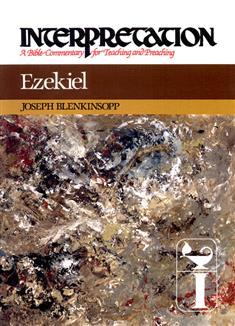
Interpretation: Ezekiel (INT)
This major work explores the message and meaning of Ezekiel, one of the longest and most difficult of the prophetic books. An introduction explains what is involved in reading a prophetic book, and how the book of Ezekiel was put together and structured. It looks at the form of speech used and discusses Ezekiel's author and those who transmitted, edited, and enlarged upon what he had to say. The destruction of Jerusalem is a primary concern, and attention is focused on the political and social situation of the time in order to provide a clear understanding of the political and religious crisis facing the prophet's contemporaries.
Interpretation: A Bible Commentary for Teaching and Preaching is a distinctive resource for those who interpret the Bible in the church. Planned and written specifically for teaching and preaching needs, this critically acclaimed biblical commentary is a major contribution to scholarship and ministry.
Joseph Blenkinsopp is John A. O'Brien Professor Emeritus of Biblical Studies at the University of Notre Dame in Notre Dame, Indiana. He is the author of Sage, Priest, Prophet: Religious and Intellectual Leadership in Ancient Israel.
Interpretation: Ezra-Nehemiah (INT)
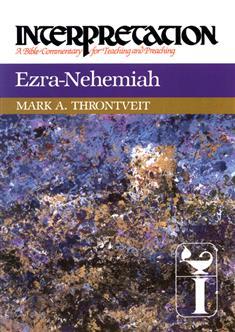
Interpretation: Ezra-Nehemiah (INT)
Studies in the books of Ezra-Nehemiah have tended to become bogged down with such questions as, "Who came first, Ezra or Nehemiah, and were they contemporaries?" "When did Ezra make his journey to Jerusalem, how many trips did he make, and which route did he take?" In this commentary, the author undertakes a theological reading which emphasizes its character as narrative and story. He avoids rearranging the text and, with the exception of chapter five of Nehemiah, he seeks to understand the narrative as it was received. In general, Mark Throntveit avoids an overly historical approach to the text and presents a clear picture of Ezra and Nehemiah.
Interpretation: A Bible Commentary for Teaching and Preaching is a distinctive resource for those who interpret the Bible in the church. Planned and written specifically for teaching and preaching needs, this critically acclaimed biblical commentary is a major contribution to scholarship and ministry.
Mark A. Throntveit is Professor of Old Testament at Luther Seminary in St. Paul, Minnesota. He also serves as Book Review Editor for Word and World.
Interpretation: First and Second Chronicles (INT)

Interpretation: First and Second Chronicles (INT)
Steven Tuell shows how the books of Chronicles present the revelation of God's plan and purposes through the history of Israel, emphasizing the important role that King David plays within that story. Using up-to-date scholarship, Tuell focuses on the theological message of these books-- that the purpose of life is to seek God, that those who find God's will and live accordingly will experience blessing, and that God's presence is found in the events of ordinary life.
Interpretation: A Bible Commentary for Teaching and Preaching is a distinctive resource for those who interpret the Bible in the church. Planned and written specifically for teaching and preaching needs, this critically acclaimed biblical commentary is a major contribution to scholarship and ministry.
Steven S. Tuell is Associate Professor of Old Testament at Pittsburgh Theological Seminary in Pittsburgh, Pennsylvania. He is an ordained elder in the United Methodist Church.
Interpretation: First and Second Kings (INT)
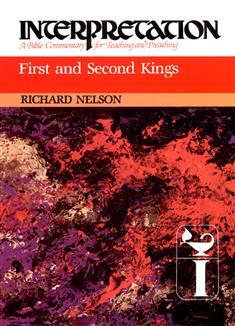
Interpretation: First and Second Kings (INT)
Richard Nelson examines the books of Kings and treats the text as theological literature, emphasizing the literary impact of this important part of the Old Testament canon. Nelson recognizes King's as a useful though uncritical source of historical information, its purpose to transform the beliefs of its first readers, to get them to re-evaluate their identity before God.
Interpretation: A Bible Commentary for Teaching and Preaching is a distinctive resource for those who interpret the Bible in the church. Planned and written specifically for teaching and preaching needs, this critically acclaimed biblical commentary is a major contribution to scholarship and ministry.
Richard D. Nelson is Professor Emeritus of Biblical Hebrew and Old Testament Interpretation at Perkins School of Theology, Southern Methodist University. He is a pastor with the Evangelical Lutheran Church in America and the author of several books, including Joshua: A Commentary in the Old Testament Library series and First and Second Kings in the Interpretation series.
Interpretation: First and Second Peter, James, and Jude (INT)
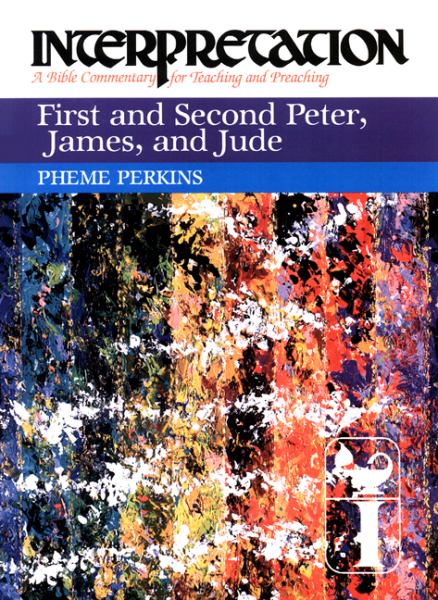
Interpretation: First and Second Peter, James, and Jude (INT)
First and Second Peter, James, and Jude have existed on the edges of the canon throughout the centuries. In this much-anticipated volume in the Interpretation series, Pheme Perkins casts light on these often neglected writings. She ably demonstrates that these "catholic epistles" have, in fact, much to offer to today's readers.
Interpretation: A Bible Commentary for Teaching and Preaching is a distinctive resource for those who interpret the Bible in the church. Planned and written specifically for teaching and preaching needs, this critically acclaimed biblical commentary is a major contribution to scholarship and ministry.
Pheme Perkins is Professor of New Testament at Boston College in Chestnut Hill, Massachusetts, and the author of several books.
Interpretation: First and Second Samuel (INT)

Interpretation: First and Second Samuel (INT)
With critical scholarship and theological sensitivity, Walter Brueggemann traces the people of God through the books of Samuel as they shift from marginalized tribalism to oppressive monarchy. He carefully opens the literature of the books, sketching a narrative filled with historical realism but also bursting with an awareness that more than human action is being presented.
Interpretation: A Bible Commentary for Teaching and Preaching is a distinctive resource for those who interpret the Bible in the church. Planned and written specifically for teaching and preaching needs, this critically acclaimed biblical commentary is a major contribution to scholarship and ministry.
Walter Brueggemann is William Marcellus McPheeters Professor Emeritus of Old Testament at Columbia Theological Seminary. An ordained minister in the United Church of Christ, he is the author of dozens of books, including Sabbath as Resistance: Saying No to the Culture of Now, A Gospel of Hope, and Interrupting Silence: God’s Command to Speak Out.
Interpretation: First and Second Thessalonians (INT)
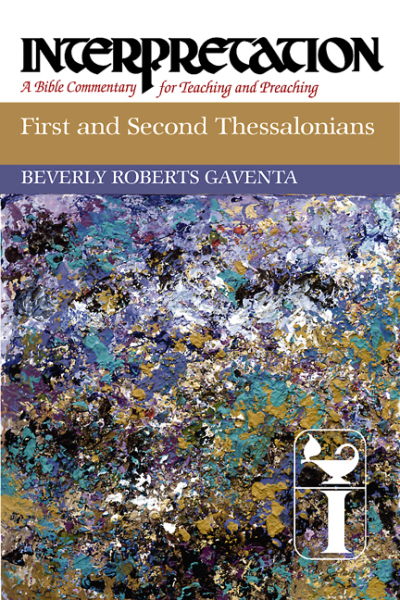
Interpretation: First and Second Thessalonians (INT)
In this brilliant commentary, Beverly Roberts Gaventa discusses the issues central to the books of Thessalonians, identifying what makes each book important for the life of the church today, as well as for preachers and teachers.
Interpretation: A Bible Commentary for Teaching and Preaching is a distinctive resource for those who interpret the Bible in the church. Planned and written specifically for teaching and preaching needs, this critically acclaimed biblical commentary is a major contribution to scholarship and ministry.
Beverly Roberts Gaventa is Helen H. P. Manson Professor of New Testament Literature and Exegesis at Princeton Theological Seminary in Princeton, New Jersey. She has published a number of books including Mary: Glimpses of the Mother of Jesus, one of the few books written about Mary by a Protestant woman.
Interpretation: First and Second Timothy and Titus (INT)
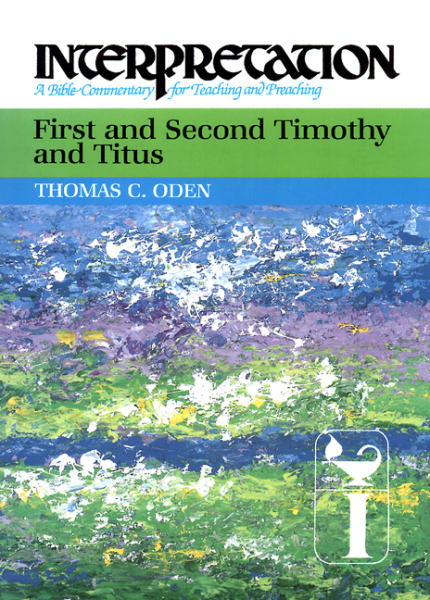
Interpretation: First and Second Timothy and Titus (INT)
Thomas Oden provides a modern commentary on the pastoral letters grounded in the classical, consensual tradition of interpretation. Oden uses the best and most accurate research concerning the historical, literary, and philological aspects of the pastoral letters. He addresses tough issues: the role of women in worship, problems of the rich and poor, the relation between servants and masters, policies concerning support of elderly widows, and how to handle church disruptions.
Interpretation: A Bible Commentary for Teaching and Preaching is a distinctive resource for those who interpret the Bible in the church. Planned and written specifically for teaching and preaching needs, this critically acclaimed biblical commentary is a major contribution to scholarship and ministry.
Thomas C. Oden is the Henry Anson Buttz Professor of Theology and Ethics at Drew University in Madison, New Jersey.
Interpretation: First Corinthians (INT)
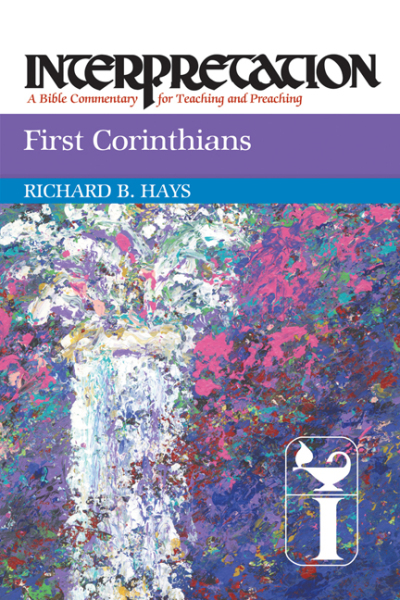
Interpretation: First Corinthians (INT)
Paul's first letter to the Corinthians was addressed originally to a fledgling mission church in Corinth. Paul's absence from the church had allowed serious problems to arise within the Corinthian community, but the problems that he addresses in this letter do not always seem based on explicitly theological ideas. The brilliance of Paul, though, is that he frames the issues in theological terms and reflects on them in the light of the gospel.
Interpretation: A Bible Commentary for Teaching and Preaching is a distinctive resource for those who interpret the Bible in the church. Planned and written specifically for teaching and preaching needs, this critically acclaimed biblical commentary is a major contribution to scholarship and ministry.
Richard B. Hays is the George Washington Ivey Professor of New Testament at Duke Divinity School in Durham, North Carolina. He is an internationally recognized scholar for his work on the letters of Paul and on New Testament ethics.
Interpretation: First, Second, and Third John (INT)
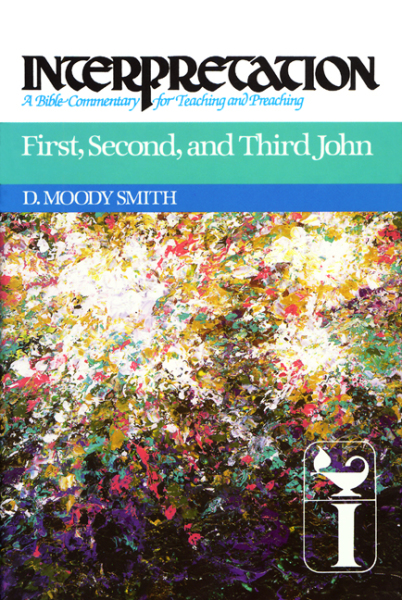
Interpretation: First, Second, and Third John (INT)
This careful and thoughtful book unlocks the door to the theological and ethical treasures contained in the Epistles of John. It is an invitation to a journey of discovery, from the well-known and familiar to the less familiar but rewarding.
Interpretation: A Bible Commentary for Teaching and Preaching is a distinctive resource for those who interpret the Bible in the church. Planned and written specifically for teaching and preaching needs, this critically acclaimed biblical commentary is a major contribution to scholarship and ministry.
D. Moody Smith is George Washington Ivey Professor Emeritus of New Testament at Duke Divinity School in Durham, North Carolina.
Interpretation: Galatians (INT)
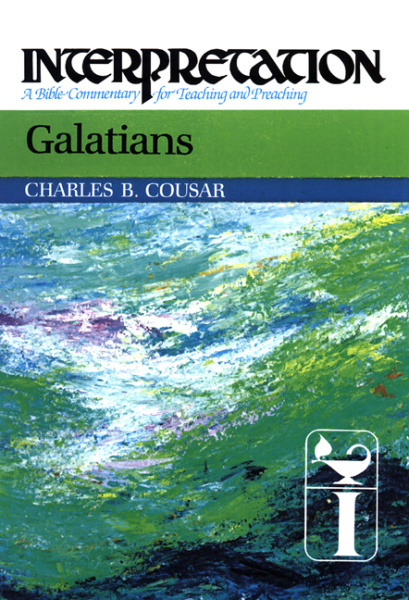
Interpretation: Galatians (INT)
Charles Cousar, in his Galatians commentary from the Interpretation series, notes Paul perceives how completely the Galatians have misunderstood the heart of the Christian faith. They work from the wrong end of the relationship with God, all about what they can do to deal with the power of the flesh and fulfilling the law. The answer lies at the other end - what God has done in Christ, and how he has done it. The reality is that "God sent forth his Son, ...to redeem those who were under the law, so that we might receive adoption as sons" (Gal 4:4-5) and there can be no compromise with any other means of dealing with the law or gaining membership in God's family, no middle ground where God does his part and humans theirs.
Grasping this radical grace may be difficult in the current times, where handouts are either suspect or expected. Per Cousar, "Circumcision has its religious and secular counterparts in the various ways in which we 'supplement' God's free gift of himself and prescribe for ourselves (or others) a particular accomplishment which becomes a "must." A piety which turns into anxiety about our spritual health and searches for unforgiven sins has forgotten what God has done in Christ and how he has done it."
Interpretation: A Bible Commentary for Teaching and Preaching is a distinctive resource for those who interpret the Bible in the church. Planned and written specifically for teaching and preaching needs, this critically acclaimed biblical commentary is a major contribution to scholarship and ministry.
Charles B. Cousar is Professor Emeritus of New Testament at Columbia Theological Seminary in Decatur, Georgia. He is the author of numerous books, including Galatians in the Interpretation commentary series. He is also coauthor of the three volumes of Texts for Preaching.
Interpretation: Genesis (INT)

Interpretation: Genesis (INT)
In his clear and readable style, Walter Brueggemann presents Genesis as a single book set within the context of the whole of biblical revelation. He sees his task as bringing the text close to the faith and ministry of the church. He interprets Genesis as a proclamation of God's decisive dealing with creation rather than as history of myth. Brueggemann's impressive perspective illuminates the study of the first book of the Bible.
Interpretation: A Bible Commentary for Teaching and Preaching is a distinctive resource for those who interpret the Bible in the church. Planned and written specifically for teaching and preaching needs, this critically acclaimed biblical commentary is a major contribution to scholarship and ministry.
Walter Brueggemann is William Marcellus McPheeters Professor Emeritus of Old Testament at Columbia Theological Seminary. An ordained minister in the United Church of Christ, he is the author of dozens of books, including Sabbath as Resistance: Saying No to the Culture of Now, A Gospel of Hope, and Interrupting Silence: God’s Command to Speak Out.
Interpretation: Hebrews (INT)
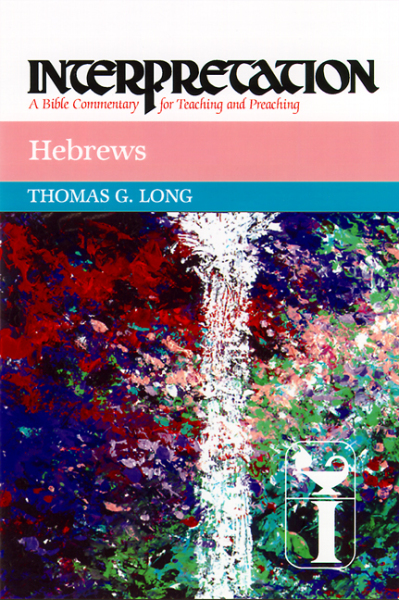
Interpretation: Hebrews (INT)
Hebrews is a sermon from the early Christian church that addresses a real, urgent, and still relevant pastoral problem: a struggling congregation that may not keep the faith. Thomas Long shows how Hebrews exhorts the church to face its challenges and hold true, even into the twenty-first century.
Interpretation: A Bible Commentary for Teaching and Preaching is a distinctive resource for those who interpret the Bible in the church. Planned and written specifically for teaching and preaching needs, this critically acclaimed biblical commentary is a major contribution to scholarship and ministry.
Rev. Dr. Thomas G. Long is the Bandy Professor of Preaching Emeritus at Candler Theological School, Emory University.
Interpretation: Hosea-Micah (INT)
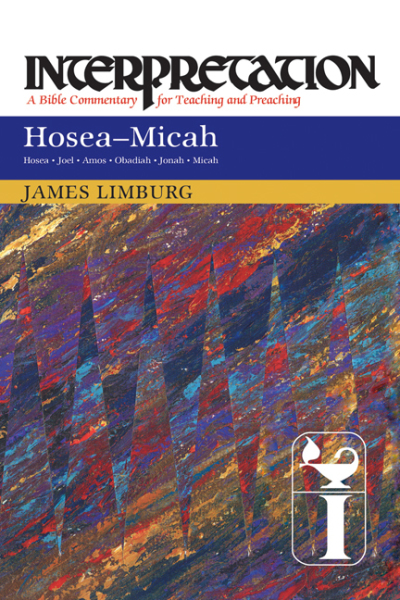
Interpretation: Hosea-Micah (INT)
James Limburg introduces the first six of the minor prophets and provides a commentary that relates to today's world. He demonstrates why attention should be given to the words of these prophets as they communicate the word of God.
Interpretation: A Bible Commentary for Teaching and Preaching is a distinctive resource for those who interpret the Bible in the church. Planned and written specifically for teaching and preaching needs, this critically acclaimed biblical commentary is a major contribution to scholarship and ministry.
James Limburg is Professor Emeritus of Old Testament at Luther Seminary in St. Paul, Minnesota.
Interpretation: Isaiah 1-39 (INT)
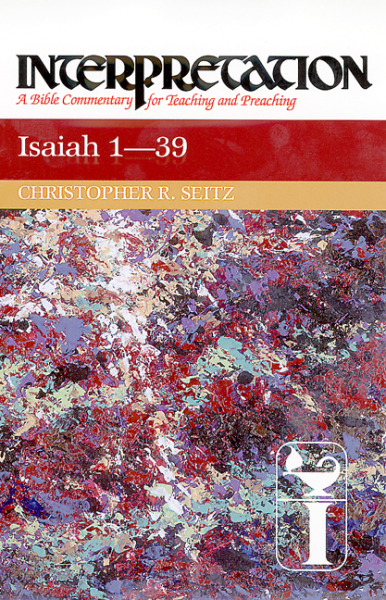
Interpretation: Isaiah 1-39 (INT)
This unique commentary allows the interpretation of Isaiah 1-39 to be guided by the final form of the book. It focuses on the theological aspect of the book of Isaiah, giving special attention to the role of literary context. Christopher Seitz explores structural and organizational concerns as clues to the editorial intention of the final form of the material, which he argues is both intelligible and an intended result of the efforts of those who gave shape to the present form of the book.
Interpretation: A Bible Commentary for Teaching and Preaching is a distinctive resource for those who interpret the Bible in the church. Planned and written specifically for teaching and preaching needs, this critically acclaimed biblical commentary is a major contribution to scholarship and ministry.
Christopher R. Seitz is Professor of Old Testament and Theological Studies at the University of Saint Andrews in Scotland. He is the author or editor of eight books including Figured Out: Typology, Providence and Christian Scripture and Nicene Christianity: The Future for a New Ecumenism.
Interpretation: Isaiah 40-66 (INT)
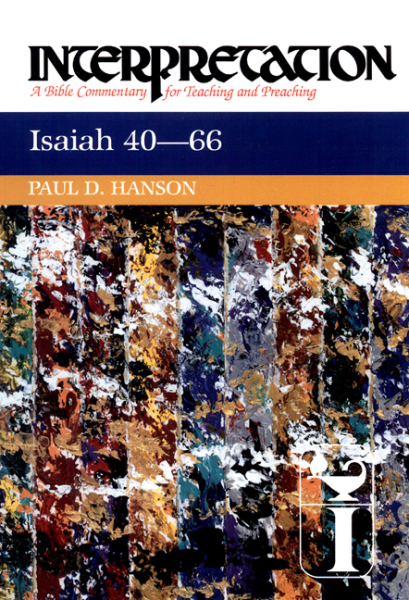
Interpretation: Isaiah 40-66 (INT)
The latter half of the sixth century BCE found the Jewish community fragmented and under great strife after having been conquered by the Babylonian armies. As a response to a growing despair over life in servitude and exile, Isaiah 40-66 was written. Paul Hanson examines the writings of Second and Third Isaiah. What he discovers is a poetic argument for a loving and attentive God and the rightful place of God's creatures in the unfolding of history.
Interpretation: A Bible Commentary for Teaching and Preaching is a distinctive resource for those who interpret the Bible in the church. Planned and written specifically for teaching and preaching needs, this critically acclaimed biblical commentary is a major contribution to scholarship and ministry.
Paul D. Hanson is the Florence Corliss Lamont Research Professor of Divinity at Harvard Divinity School where he has been teaching the Old Testament since 1971. His books include Isaiah 40-66 in the esteemed Interpretation series and The People Called: The Growth of Community in the Bible.
Interpretation: Jeremiah (INT)
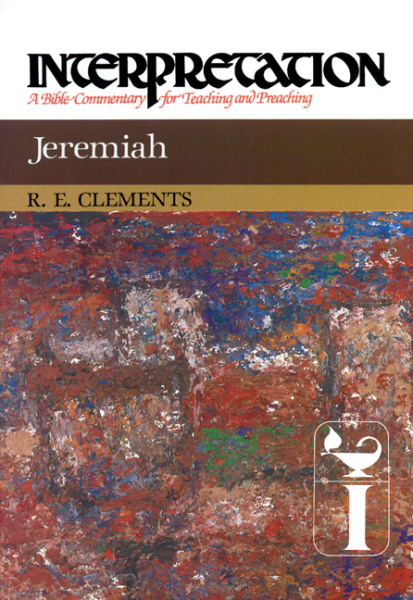
Interpretation: Jeremiah (INT)
This critical assessment of the book of Jeremiah enables the reader to rediscover many of the most profound and relevant features of Jeremiah's message and of the agonies and fears of those to whom it was first given. The picture that emerges of the prophet is an intensely moving one, often at variance with the conventional image of earlier popular reconstructions. Having witnessed the loss of most of the treasured and revered religious support of his day, Jeremiah discovered that the only secure foundation of hope is in God.
Interpretation: A Bible Commentary for Teaching and Preaching is a distinctive resource for those who interpret the Bible in the church. Planned and written specifically for teaching and preaching needs, this critically acclaimed biblical commentary is a major contribution to scholarship and ministry.
Ronald E. Clements is Professor Emeritus of Old Testament Studies at King's College, University of London.
Interpretation: Job (INT)
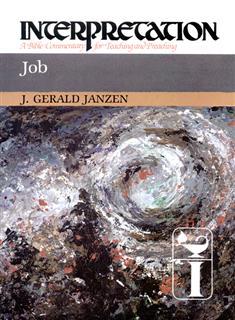
Interpretation: Job (INT)
In this volume, J. Gerald Janzen examines the text of the book of Job as a literary text within the context of the history of the religion of Israel and within the broader context of the universal human condition. He approaches the basic character of the book from a literary perspective which enables him to identify human existence as exemplified in Job and to expound on the mystery of good and evil, which gives human existence its experiential texture and which together drive humans to ask the same kind of questions asked by Job. This is the first full-length commentary to present Job systematically and literarily.
Interpretation: A Bible Commentary for Teaching and Preaching is a distinctive resource for those who interpret the Bible in the church. Planned and written specifically for teaching and preaching needs, this critically acclaimed biblical commentary is a major contribution to scholarship and ministry.
J. Gerald Janzen is MacAllister-Petticrew Professor Emeritus of Old Testament at Christian Theological Seminary in Indianapolis, Indiana. He is the author of numerous books and articles on the Old Testament.
Interpretation: John (INT)
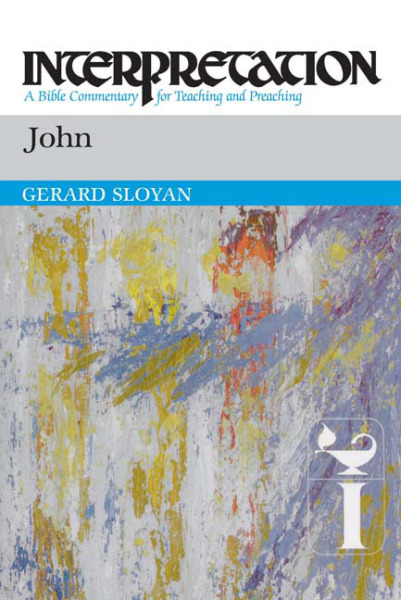
Interpretation: John (INT)
In this volume, Gerard Sloyan utilizes the lectionary approach to offer new insights into understanding the book of John. In so doing, he puts the Fourth Gospel in the Old Testament context within which the early church received the public readings of this Gospel. His emphasis on the use of John within first-century Christianity enables modern readers to grasp the meaning of the Gospel message.
Interpretation: A Bible Commentary for Teaching and Preaching is a distinctive resource for those who interpret the Bible in the church. Planned and written specifically for teaching and preaching needs, this critically acclaimed biblical commentary is a major contribution to scholarship and ministry.
Gerard Sloyan is Professor Emeritus of Religion at Temple University in Philadelphia, Pennsylvania, Distinguished Professorial Lecturer in the Theology Department at Georgetown University in Washington D.C., and Visiting Professor of Religion and Religious Education at The Catholic University of America in Washington, D.C.
Interpretation: Joshua (INT)
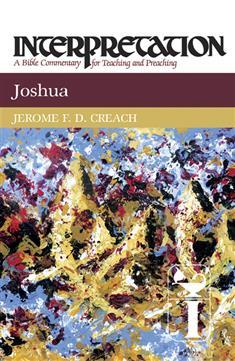
Interpretation: Joshua (INT)
This commentary clearly presents the episodes in the book of Joshua as the people of Israel face the challenges of entering into the land of promise. Both the historical and theological meanings of the book are presented throughout this most helpful commentary.
Interpretation: A Bible Commentary for Teaching and Preaching is a distinctive resource for those who interpret the Bible in the church. Planned and written specifically for teaching and preaching needs, this critically acclaimed biblical commentary is a major contribution to scholarship and ministry.
Jerome F.D. Creach is the Robert C. Holland Professor of Old Testament at Pittsburgh Theological Seminary. Creach is interested in Old Testament theology and the appropriation of the Bible to the life of the Church. Psalms and Prophets are his primary areas of research. He has published five books and numerous articles and reviews in journals for biblical studies.
Interpretation: Judges (INT)

Interpretation: Judges (INT)
This volume studies the biblical book of Judges, which focuses on the period in Israel's history when the nation was ruled by a series of judges. The book describes the progressive deterioration of the nation as a result of the violence and idolatry of the people. Yet the nation also encountered the astounding graciousness of the God who remained faithful to them.
Interpretation: A Bible Commentary for Teaching and Preaching is a distinctive resource for those who interpret the Bible in the church. Planned and written specifically for teaching and preaching needs, this critically acclaimed biblical commentary is a major contribution to scholarship and ministry.
J. Clinton McCann Jr. is Evangelical Professor of Biblical Interpretation at Eden Theological Seminary in St. Louis, Missouri. He is the author of Judges in the Interpretation commentary series.
Interpretation: Lamentations (INT)
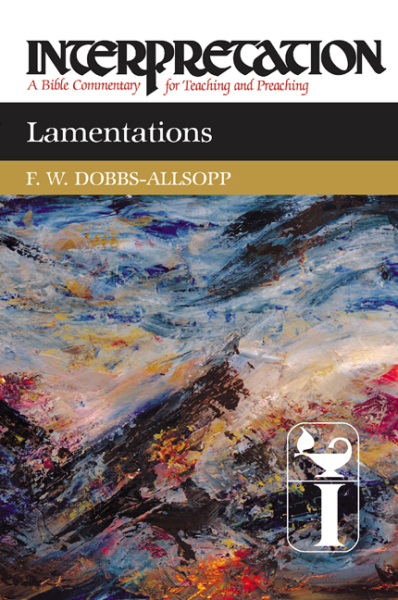
Interpretation: Lamentations (INT)
In the face of suffering, agony, and the brutal realities of life; in the midst of divine silence and human pain, the Lamentations poems speak of faith and trust in God. This sophisticated yet accessible commentary makes the message of Lamentations come alive. All who preach and teach will benefit from this rich resource.
Interpretation: A Bible Commentary for Teaching and Preaching is a distinctive resource for those who interpret the Bible in the church. Planned and written specifically for teaching and preaching needs, this critically acclaimed biblical commentary is a major contribution to scholarship and ministry.
F. W. Dobbs-Allsopp is Associate Professor of Old Testament at Princeton Theological Seminary in Princeton, New Jersey. He is coauthor of Two Early Alphabetic Inscriptions from the Wadi el-Hol and Hebrew Inscriptions: Texts from the Biblical Period of the Monarchy, with Concordance.
Interpretation: Leviticus (INT)

Interpretation: Leviticus (INT)
This volume in the popular Interpretation series presents the book of Leviticus. It focuses on the history of Israel during this time when Israel's life was marked by the various ritual sacrifices and observances commanded by God for the ordering of the nation's life.
Interpretation: A Bible Commentary for Teaching and Preaching is a distinctive resource for those who interpret the Bible in the church. Planned and written specifically for teaching and preaching needs, this critically acclaimed biblical commentary is a major contribution to scholarship and ministry.
Samuel E. Balentine is Professor of Old Testament at Union Presbyterian Seminary in Richmond, Virginia. He is the author of The Torah's Vision of Worship.
Interpretation: Luke (INT)
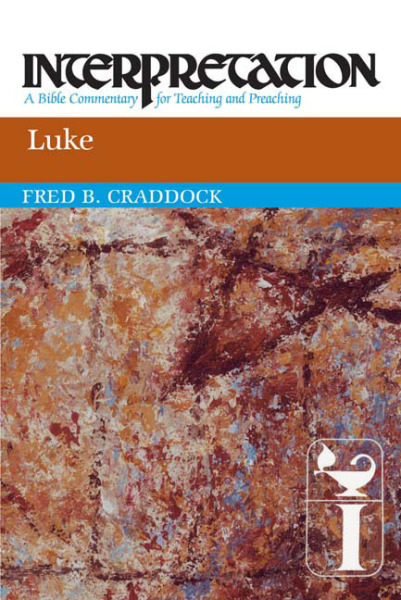
Interpretation: Luke (INT)
Using Luke's own prologue as the guideline for his commentary, Fred B. Craddock calls attention to the continuities between Jesus and his heritage in Judaism and the church after him. Like Luke, Craddock assumes the reader is not only a believer but also a leader in the community of faith.
Interpretation: A Bible Commentary for Teaching and Preaching is a distinctive resource for those who interpret the Bible in the church. Planned and written specifically for teaching and preaching needs, this critically acclaimed biblical commentary is a major contribution to scholarship and ministry.
Fred B. Craddock is Bandy Distinguished Professor Emeritus of Preaching and New Testament at Candler School of Theology, Emory University, Atlanta, Georgia. He is also Minister Emeritus at Cherry Log Christian Church (Disciples of Christ) in Cherry Log, Georgia.
Interpretation: Mark (INT)
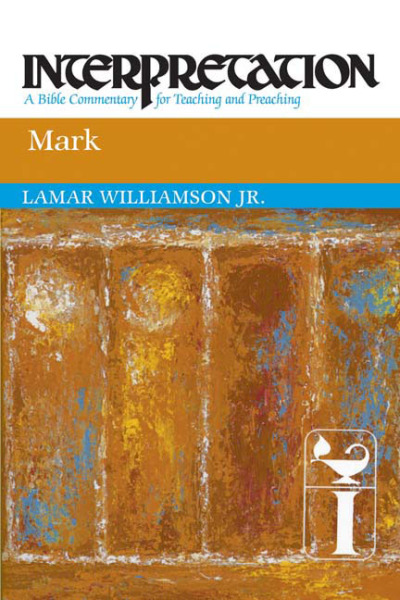
Interpretation: Mark (INT)
In this volume, Lamar Williamson's commentary provides teachers, preachers, and all serious students of the Bible with an interpretation that takes serious hermeneutical responsibility for the contemporary meaning and significance of Mark's text.
Interpretation: A Bible Commentary for Teaching and Preaching is a distinctive resource for those who interpret the Bible in the church. Planned and written specifically for teaching and preaching needs, this critically acclaimed biblical commentary is a major contribution to scholarship and ministry.
Lamar Williamson Jr. is Professor Emeritus of Biblical Studies at Union Theological Seminary and Presbyterian School of Christian Education in Richmond, Virginia. His published works include Preaching the Gospel of John and Mark in the Interpretation commentary series, both published by WJK.
Interpretation: Matthew (INT)
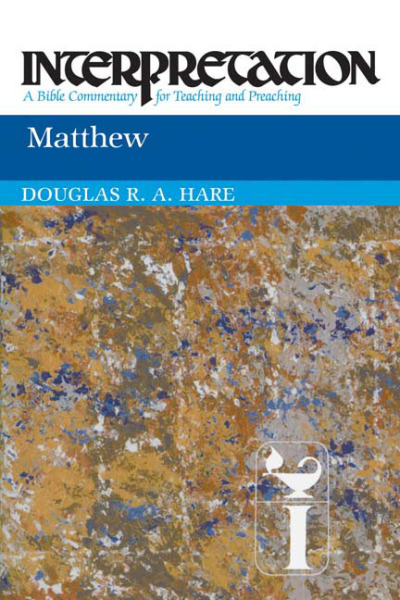
Interpretation: Matthew (INT)
This commentary proceeds unit by unit (not verse by verse) to emphasize what each passage of Matthew means to the author of the Gospel and to the modern church. Douglas Hare shows that the purpose of Matthew's writing is to convince Christians that a genuine faith in Christ must be demonstrated in daily obedience and that faith and ethics are two sides of the same coin.
Interpretation: A Bible Commentary for Teaching and Preaching is a distinctive resource for those who interpret the Bible in the church. Planned and written specifically for teaching and preaching needs, this critically acclaimed biblical commentary is a major contribution to scholarship and ministry.
Douglas R. A. Hare is William H. Orr Professor of New Testament Emeritus at Pittsburgh Theological Seminary in Pittsburgh, Pennsylvania.
Interpretation: Nahum-Malachi (INT)
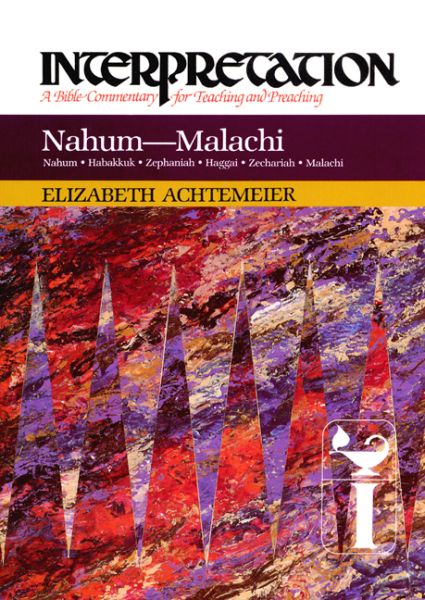
Interpretation: Nahum-Malachi (INT)
Elizabeth Achtemeier examines the often-neglected Minor Prophets and explains them as they reflect the church at worship and at work. She sets the Minor Prophets in their canonical context emphasizing the relationship between the message of these prophets and the New Testament. Unique in the use of brief quotations from great preachers' sermons on the prophets, Nahum-Malachi is enriched with the vast insightful store of homiletical interpretation available today.
Interpretation: A Bible Commentary for Teaching and Preaching is a distinctive resource for those who interpret the Bible in the church. Planned and written specifically for teaching and preaching needs, this critically acclaimed biblical commentary is a major contribution to scholarship and ministry.
Elizabeth Achtemeier taught Bible and Homiletics at Union Presbyterian Seminary in Richmond, Virginia. She was an ordained minister of the Presbyterian Church (U.S.A), a preacher, and the author of a number of books, including Nature, God, and the Pulpit and Preaching from the Minor Prophets.
Interpretation: Numbers (INT)

Interpretation: Numbers (INT)
Numbers chronicles a community faced with many competing interests, groups, and issues, endeavoring to define itself and its mission in the world. Dennis Olsen offers readers a comprehensive interpretation of this often overlooked book. He provides a thoroughly contemporary reading of Numbers that enlightens the modern church as it navigates the contemporary wilderness of pluralism, competing voices, and and shifting foundations.
Interpretation: A Bible Commentary for Teaching and Preaching is a distinctive resource for those who interpret the Bible in the church. Planned and written specifically for teaching and preaching needs, this critically acclaimed biblical commentary is a major contribution to scholarship and ministry.
Dennis T. Olsen is Charles T. Haley Professor of Old Testament Theology at Princeton Theological Seminary in Princeton, New Jersey. His published works include Deuteronomy and the Death of Moses, A Theological Reading and Pentateuchal Narratives.
Interpretation: Philippians (INT)
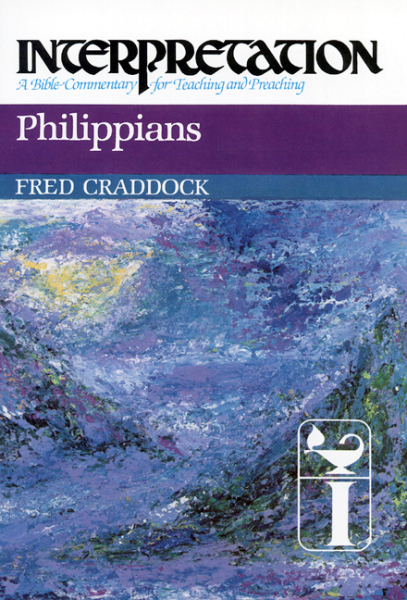
Interpretation: Philippians (INT)
In this commentary, Fred Craddock focuses on the text of Philippians rather than on conversations among scholars about the text. His commentary on the text differs from many other commentaries in that issues of authorship, date, place of writing, integrity, or purpose are dealt with at points where the text itself raises these issues. In order to assist those who preach, Craddock gives special attention to passages that appear in most lectionaries. Further, he draws attention to the theology of Paul as reflected in all his letters wherever it enlightens or is enlightened by the text. Craddock helps the reader understand what it meant for an apostle and a church to be partners in the gospel.
Interpretation: A Bible Commentary for Teaching and Preaching is a distinctive resource for those who interpret the Bible in the church. Planned and written specifically for teaching and preaching needs, this critically acclaimed biblical commentary is a major contribution to scholarship and ministry.
Fred B. Craddock is Bandy Distinguished Professor Emeritus of Preaching and New Testament at Candler School of Theology, Emory University, Atlanta, Georgia. He is also Minister Emeritus at Cherry Log Christian Church (Disciples of Christ) in Cherry Log, Georgia.
Interpretation: Proverbs (INT)
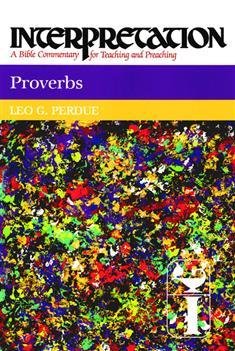
Interpretation: Proverbs (INT)
The book of Proverbs is a collection of sayings, poems, and "life's little instructions." Wrestling with the values of things such as creation, livelihood, or moral character, Proverbs exhorts its readers to seek the higher ideals--knowledge, discipline, piety, and order--and offers guidance on how to live in harmony with God, others, and oneself.
Interpretation: A Bible Commentary for Teaching and Preaching is a distinctive resource for those who interpret the Bible in the church. Planned and written specifically for teaching and preaching needs, this critically acclaimed biblical commentary is a major contribution to scholarship and ministry.
Leo G. Perdue is Professor of Hebrew Bible at Brite Divinity School in Fort Worth, Texas. He is an international authority on wisdom literature and the author of numerous books, including Proverbs in the esteemed Interpretation commentary series.






- Adapt your commentary collection month-to-month based on the book or books you are studying.
- Build your commentary library strategically without hundreds of dollars of upfront investment.
- Never get stuck with commentaries you rarely use - swap them out each month as your needs change.



